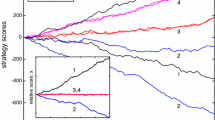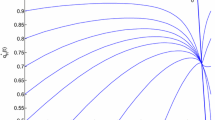Abstract
We propose a simple dynamic adjustment mechanism, equivalent to the standard replicator dynamics in discrete time, to study the time evolution of a population of players facing a binary choice game, and apply this mechanism to minority games in order to investigate the effects of memory on the stability of the unique Nash equilibrium. Two different kinds of memory are considered, one where the players take into account the current and the previous payoffs in order to decide the strategy chosen in the next period, and the other one where the players consider the whole series of payoffs observed in the past through a discounted sum with exponentially fading weights. Both the memory representations proposed lead to an analytically tractable two-dimensional dynamical system, so that analytical results can be given for the stability of the Nash equilibrium. However, a global analysis of the models – performed by numerical methods and guided by the analytical results – shows that some complexities arise for intermediate values of the memory parameter, even if the stabilization effect of uniform memory is stated in both cases.






Similar content being viewed by others
References
Aicardi F, Invernizzi S (1992) Memory effects in discrete dynamical systems. Int J Bifur Chaos 2(4):815–830
Allport F (1924) Social psychology. Houghton Mifflin The Riverside Press, Cambridge
Arthur W B (1994) Inductive reasoning and bounded rationality. Am Econ Rev 84:406–411
Bischi G I, Merlone U (2009) Global dynamics in binary choice models with social influence. J Math Sociol 33(4):277–302
Bischi G I, Merlone U (2010) Binary choices in small and large groups: a unified model. Phys A: Stat Mech Appl 389(4):843–853
Bischi G I, Gardini L, Merlone U (2009) Impulsivity in binary choices and the emergence of periodicity. Discrt Dyn Nat Soc 2009(Article ID 407913):22 pages. doi:10.1155/2009/407913
Cabrales A, Sobel J (1992) On the limit points of discrete selection dynamics. J Econ Theory 57:407–419
Cavagna A (1999) Irrelevance of memory in the minority game. Phys Rev E 59(4):3783–3786
Challet D, Marsili M (2000) Relevance of memory in minority games. Phys Rev E 62(2):1862–1868
Challet D, Zhang Y (2010) Emergence of cooperation and organization in an evolutionary game. Phys A: Stat Mech Appl 246:407–418
Challet D, Marsili M, Zhang Y (2005) Minority games. Oxford University Press, Oxford
Cressman R, Tao Y (2014) The replicator equation and other game dynamics. Proc Natl Acad Sci USA 111(3):10810–10817
Devaney R L (1989) An introduction to chaotic dynamical systems perseus books, 2nd edn. Reading, MA
Dindo P (2005) A tractable evolutionary model for the minority game with asymmetric payoffs. Phys A: Stat Mech Appl 335(4):110–118
Dohtani A, Inaba T, Osaka H (2007) Time and space in economics. In: Asada T, Ishikawa T (eds) Business cycles dynamics. Models and tools. Springer, New York, pp 129–143
Elaydi S (1995) An introduction to difference equations. Springer-Verlag, New York
Fazeli A, Jadbabaie A (2012) Duopoly pricing game in networks with local coordination effects. Maui, pp 74–79
Franke R (2003) Reinforcement learning in the El Farol model. J Econ Behav Organ 51:367–388
Gandolfo G (2010) Economic dynamics. Springer-Verlag, New York
Granovetter M (1978) Threshold models of collective behavior. Am J Sociol 83(1):1420–1443
Granovetter M, Soong R (1983) Threshold models of diffusion and collective behavior. J Math Sociol 9(3):165–179
Guckenheimer J, Holmes P (1983) Nonlinear oscillations, dynamical systems, and bifurcations of vector fields. Springer-Verlag, New York
Hinson J M, Jameson T L, Whitney P (2003) Impulsive decision making and working memory. J Exper Psychol Learn Memory Cogn 29:298–306
Hofbauer J, Sigmund K (2003) Evolutionary game dynamics. Bull Amer Math Soc 40(4):479–519
Holmes J, Manning R (1988) Memory and market stability: the case of the cobweb. Econ Lett 28:1–7
Hovi J (1986) Binary games as models of public goods provision. Scand Polit Stud 9(4):337–360
Leijonhufvud A (1973) Effective demand failures. Swed J Econ 75(1):27–48
Lorenz H (1993) Nonlinear dynamical economics and chaotic motion, 2nd edn. Springer-Verlag, New York
Mahajan V, Muller E, Bass F M (1990) New product diffusion models in marketing: a review and directions for research. J Mark 54(1):1–26
Medio A, Lines M (2001) Nonlinear dynamics. Cambridge University Press, Cambridge
Schelling T C (1973) Hockey helmets, concealed weapons, and daylight saving: a study of binary choices with externalities. J Conflict Resol 17(3):381–428
Schelling T C (1978) Micromotives and macrobehavior. W. W. Norton, New York
Simon H A (1990) Bounded rationality. In: Eatwell J, Milgate M, Newman P (eds) Utility and probability. Palgrave Macmillan UK, London, pp 15–18
Stahl D O, Haruvy E (2008) Level-n bounded rationality and dominated strategies in normal-form games. J Econ Behav Organ 66:226–232
van Ginneken J (2003) Collective behavior public opinion. Lawrence Erlbaum Associates, Mahwah
Acknowledgments
Work developed in the framework of the research project on “Dynamic Models for behavioural economics” financed by DESP-University of Urbino. Ugo Merlone gratefully acknowledges the Department of Economics of Chuo University in Tokyo for funding his participation to the Tokyo NED conference.
Author information
Authors and Affiliations
Corresponding author
Ethics declarations
Conflict of interests
The authors declare that they have no conflict of interest.
Rights and permissions
About this article
Cite this article
Bischi, G., Merlone, U. Evolutionary minority games with memory. J Evol Econ 27, 859–875 (2017). https://doi.org/10.1007/s00191-017-0526-4
Published:
Issue Date:
DOI: https://doi.org/10.1007/s00191-017-0526-4




